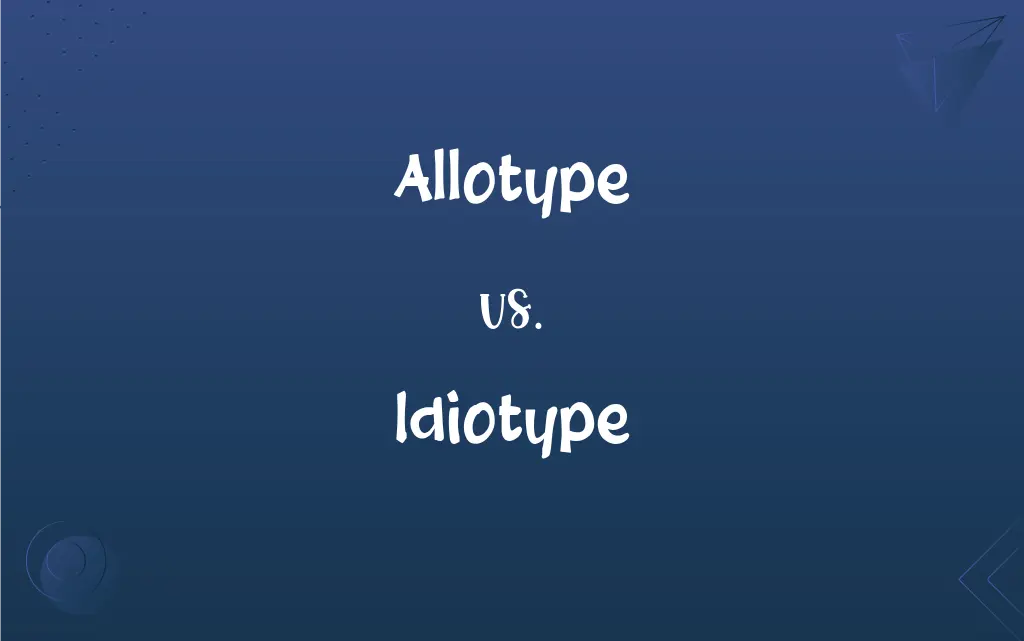Allotype vs. Idiotype: What's the Difference?
Edited by Aimie Carlson || By Janet White || Published on March 15, 2024
Allotype refers to genetic variations in antibodies within a species, while idiotype refers to unique antigen-binding sites on an antibody.

Key Differences
Allotype and idiotype are terms related to immunology, focusing on antibody characteristics. Allotype refers to the genetic variations found in the antibodies produced by different individuals of the same species. These variations are due to differences in the genetic coding of immunoglobulins. In contrast, idiotype refers to the unique set of antigen-binding sites of an antibody, which are specific to each individual antibody molecule.
The concept of allotype is significant in the context of immune responses across a population. It highlights the diversity of antibody responses due to genetic differences. Allotypes are useful in understanding population-wide immune responses and potential vulnerabilities to pathogens. On the other hand, idiotype is critical for understanding the specificity of the immune response. The idiotype defines how an antibody recognizes and binds to a specific antigen, playing a key role in the effectiveness of the immune response.
Allotype variations are inherited and are a result of genetic diversity within a species. These variations can be tracked and studied to understand hereditary patterns in immune responses. Conversely, idiotype variations are not inherited but are a result of the random recombination and mutation processes that generate diverse antibody molecules. The idiotype is unique to each antibody, reflecting the vast potential for antigen recognition and response.
In clinical applications, allotype information is used in blood transfusions and organ transplants to ensure compatibility. The understanding of allotypes helps in reducing the risk of immune reactions. Idiotype, however, is crucial in the development of monoclonal antibody therapies. Therapies targeting specific idiotypes can provide highly targeted treatments for diseases like cancer, where the idiotype of antibodies produced by cancer cells can be a therapeutic target.
In research, allotypes are studied to understand the evolutionary aspects of the immune system, showing how populations adapt to pathogens over time. Idiotypes, in contrast, are studied to understand the mechanisms of immune system specificity and memory, contributing to vaccine development and understanding autoimmune diseases.
ADVERTISEMENT
Comparison Chart
Definition
Genetic variation in antibodies within a species.
Unique antigen-binding sites on an antibody.
Inheritance
Inherited from parents.
Not inherited, results from random processes.
Role in Immunity
Contributes to population-wide diversity in immune response.
Determines specificity of antibody-antigen interaction.
Clinical Importance
Important in blood transfusions and organ transplants for compatibility.
Key in developing monoclonal antibody therapies.
Research Significance
Used to study evolutionary patterns in immune responses.
Studied for vaccine development and autoimmune diseases.
ADVERTISEMENT
Allotype and Idiotype Definitions
Allotype
A specific form of an antibody that varies between individuals of the same species.
The vaccine was effective across different allotypes present in the population.
Idiotype
The specific antigen-binding region of an antibody, determining its specificity.
Scientists analyzed the idiotype to understand how the antibody neutralized the pathogen.
Allotype
A variant form of an antibody present in some individuals of a species.
The presence of a unique allotype in her antibodies indicated a rare genetic variation.
Idiotype
A set of antigenic determinants unique to an individual antibody.
The monoclonal antibody therapy was designed to target a cancer cell's specific idiotype.
Allotype
A genetically determined variant of a protein, especially an antibody, found in some but not all individuals of a species.
The allotype of his blood proteins was key in matching him with a compatible organ donor.
Idiotype
The unique molecular structure of an antibody that defines its antigen-binding properties.
Each idiotype was tested for its ability to recognize different strains of the bacteria.
Allotype
A subtype of immunoglobulin determined by genetic inheritance.
Researchers identified a new allotype in the immunoglobulin of the population.
Idiotype
The unique configuration of an antibody's variable region that binds to antigens.
The vaccine's effectiveness depended on its interaction with the idiotype of the immune cells.
Allotype
(Taxonomy) A biological specimen that is the opposite sex of a holotype.
Idiotype
A unique part of an antibody's structure that binds to a specific antigen.
The idiotype of the antibody was perfectly matched to the antigen of the virus.
Allotype
(Immunology) Any of several variants in the constant region of a given class or subclass of immunoglobulins that are caused by allelic variation and differ from individual to individual.
Idiotype
The complete set of idiotopes contained within the variable region of a particular immunoglobulin molecule and making up the molecule's antigen binding site.
Allotype
A designated paratype of a species (or lower-order taxon) that is the opposite sex of the holotype.
Idiotype
(immunology) A characteristic shared by a group of immunoglobulin or T-cell receptor molecules, based on the antigen-binding specificity of their variable region; and thus, the resultant immunologic phenotype, which can often be specific to a person or to only a small percentage of people.
Allotype
(biochemistry) A genetically determined variant of the amino acid sequence of a protein.
Allotype
(immunology) An immunoglobulin allotype; the allele of the antibody chains found in an individual.
Allotype
A genetically encoded variant of an immunoglobulin found in some members of a species.
Her unique allotype provided insights into the genetic diversity of the immune system.
FAQs
Can allotype affect blood transfusions?
Yes, allotype can affect blood transfusions and organ transplants due to immune compatibility.
Are idiotypes the same in all antibodies?
No, each antibody has a unique idiotype based on its antigen-binding sites.
How is allotype inherited?
Allotype is inherited from parents, as it is a genetic characteristic.
Is idiotype inherited?
No, idiotype is not inherited; it is determined by the unique combination of variable regions in an antibody.
What is the significance of idiotype in therapy?
Idiotype is significant in monoclonal antibody therapies for diseases like cancer.
What does idiotype refer to?
Idiotype refers to the unique antigen-binding sites on an antibody.
Can idiotype variations lead to autoimmune diseases?
Yes, abnormal idiotype responses can contribute to the development of autoimmune diseases.
What is an allotype?
An allotype is a genetically determined variant of an antibody found in some individuals of a species.
Do all individuals have the same allotypes?
No, allotypes vary among individuals within a species.
What role does idiotype play in vaccine development?
Idiotype plays a crucial role in determining how antibodies recognize and neutralize specific antigens in vaccines.
How are allotypes identified?
Allotypes are identified through genetic testing and protein analysis.
Does idiotype variation affect allergy responses?
Yes, idiotype variation can affect the specificity and severity of allergy responses.
Are allotypes the same across different species?
No, allotypes vary not only within a species but also across different species.
How specific is an idiotype to an antigen?
An idiotype is highly specific to an antigen, allowing precise binding and immune response.
Can allotypes change over an individual's lifetime?
No, allotypes are genetically determined and remain constant throughout life.
Can idiotype be used to design personalized medicine?
Yes, idiotype analysis can be used to develop personalized medical treatments, especially in cancer therapy.
Can allotype influence disease susceptibility?
Yes, certain allotypes may influence susceptibility to or protection against specific diseases.
How does idiotype contribute to immune system memory?
Idiotype contributes to immune system memory by allowing the body to recognize and quickly respond to previously encountered antigens.
Is studying allotype important for evolutionary biology?
Yes, studying allotypes helps understand evolutionary adaptations in the immune system.
What's the difference between allotype and blood type?
Allotype refers to genetic variations in antibodies, while blood type is determined by antigens on the surface of red blood cells.
About Author
Written by
Janet WhiteJanet White has been an esteemed writer and blogger for Difference Wiki. Holding a Master's degree in Science and Medical Journalism from the prestigious Boston University, she has consistently demonstrated her expertise and passion for her field. When she's not immersed in her work, Janet relishes her time exercising, delving into a good book, and cherishing moments with friends and family.
Edited by
Aimie CarlsonAimie Carlson, holding a master's degree in English literature, is a fervent English language enthusiast. She lends her writing talents to Difference Wiki, a prominent website that specializes in comparisons, offering readers insightful analyses that both captivate and inform.
































































